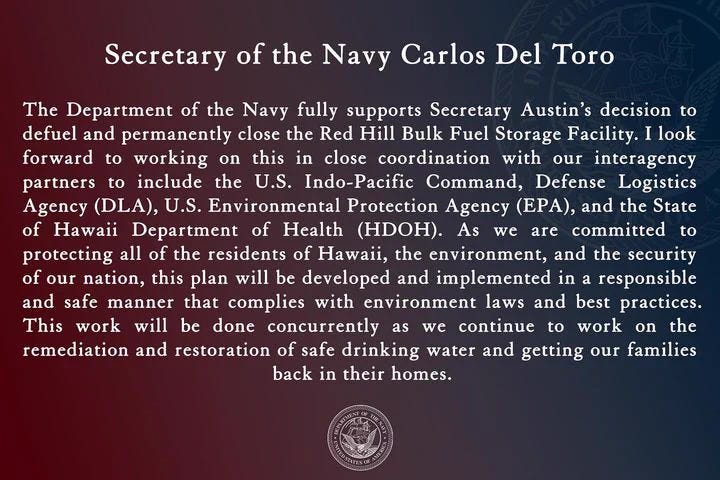Red Hills & the Numbing Power of a Culture of Lies
you mean lies, like we learned to do early in our FITREPS
A lie is a strong word, I know. It shouldn’t be used all that often, I agree with that admonition as well. It can be considered a “fighting word” - this is true. But what is one to do when other words fail to quite describe what is being done?
I don’t know any objective and knowledgeable source who believes this;
The Pentagon has officially told Congress that military operations in the Pacific will not be adversely affected by the closure of the Navy’s underground Red Hill Bulk Fuel Storage Facility.
During a news briefing on Tuesday, Pentagon press secretary Brig. Gen. Pat Ryder said that the notification “reflects the department’s ongoing commitment to defuel and ultimately close the Red Hill Bulk Fuel Storage Facility, while upholding our responsibility to ensure the readiness of our armed forces.”
The report was required by Section 331 (c) of the National Defense Authorization Act for Fiscal Year 2023. The provision states that the secretary of defense must first certify to the congressional defense committees that defueling the facility won’t adversely affect the military’s ability to fuel its Pacific operation before the military can begin draining the 104 millions of fuel in the tanks — which sit just 100 feet above a critical aquifer that most of Honolulu relies on for drinking water.
The Pentagon currently considers the Pacific its top-priority theater of operations as tensions simmer with China. Much of the focus has been on the South China Sea, a critical waterway that more than a third of all international trade moves through.
The Pacific is dominated by the tyranny of distance. Logistics, and specifically the ability to get fuel to forward deployed forces and keeping them in the fight, it one of the most critical parts of being able to reach across that vast water to project power. Red Hills exists as a result of the hard lessons of the previous large war in the Pacific. Without its capacity - there is no substitution.
People forget that for much of the opening year+ of WWII, many of our battleships were not sent to the Southwest Pacific because we had yet to generate the capacity to transport the fuel to support them.
I would refer everyone to, of all places, the Air Force Journal of Logistics’s article by Lieutenant Colonel Patrick H. Donovan, USAF titled, Oil in the Pacific War.
You can read it free at the above link or … it is so damn good you can get it on Kindle or Paperback;
Pearl Harbor Was the Only Filling Station in Town
Pearl Harbor was the only refueling, replacement, and repair point for ships operating in the Hawaiian area.84 Part of Pearl Harbor’s duty of being the Pacific Fleet’s chandlery was the stocking and disbursing of oil. To that end, the Navy had just finished restocking its tanks in Pearl Harbor to their total capacity of 4.5 million barrels of oil.85 The loss of this amount of oil would have effectively driven the Pacific Fleet back to the west coast and effectively knocked almost all ships of the Pacific Fleet out of contention, instead of just 19.86 The Japanese knew the importance of oil to a fighting fleet; after all, they had just started a war to achieve a secure source of oil. Why did they not see that the US Fleet needed a secure source of oil if it was to operate in the vast reaches of the Pacific?
Genda later wrote that the question of demolishing the oil tanks only arose after the attack’s amazing success. “That was an instance of being given an inch and asking for a mile.”87 He insisted that the objective of the plan was to destroy American warships so they could not interfere with the Southern Operation; oil tanks did not enter into the original idea.
As no one could charge Genda with lacking either imagination or vision, this uncharacteristic obtuseness could be due only to failure to understand the importance of logistics. Most Japanese naval planners apparently suffered from this same myopia toward the less glamorous necessities of modern warfare.
The Hawaiian Islands produced no oil; every drop had to be tanked from the mainland. Destruction of the Pacific Fleet’s fuel reserves, plus the tanks in which it was stored, would have immobilized every ship based at Pearl Harbor, not just those struck on December 7 . . . . “We had 4 million barrels of oil out there, and all of it was vulnerable to .50 caliber bullets.”88
At the opening of WW2, Hawaii held 4.5 million barrels. That is 189 million gallons.
Red Hills’ capacity was 250 million gallons.
Spin is one thing. Deflection is another thing. This is something altogether different.
I will remind everyone that the disaster at Red Hills derives from the same problem that begat the fires in Lahaina this summer. Anyone who has lived in Hawaii knows what it is and that this to true. The strategic stability of the entire nation in the Pacific is being sacrificed to avoid upsetting the system of political and union corruption, patronage, cronyism, and incompetence that characterizes the state, local, and federal civilian controlled projects in that one-party state.
We are tempting defeat in any war west of the International Date Line because we refuse to hold people accountable and speak truth to long standing problems that are, in the end, people based and politically centered.
Hawaii’s problem is now our military’s problem … but in some ways, it is the same problem.
A culture of petty lies with big consequences.
To add to this enabling of a culture of professional incompetence, we should all firmly understand that at some point our military took its commendable habit of lies and deception of its enemy in war - a good and honorable tradition - and has turned it against itself, the nation is serves, and the Congress that pays its bells.
There is where this issue lands. Congress demanded a report, and in return it was fed a plate of lies.
Eric Sayers’s comments from over a year ago remain as valid now as then;
The Pentagon’s decision in March to shut down its massive Red Hill Bulk Fuel Storage Facility at Pearl Harbor, Hawaii, over water contamination problems, without a clear plan in place to fund and reconstitute this capacity, has only magnified existing logistics challenges, said Eric Sayers, a former senior adviser to U.S. Pacific Command who is now a fellow at the American Enterprise Institute.
“Ukraine reminds us that without a robust combat logistics fleet for the Navy, aerial refueling, and heavy lift, we just flat out won’t be able to sustain and shift combat power around the theater in the ways that will be required before and during an intense military operation,” Sayers said. “In short, the Congress should be devoting the same level of oversight to Indo-Pacific Command fuel requirements as it does to Navy fleet size or Air Force fighter procurement.”
We should have had a report that laid bare the challenges this closure will create. It isn’t classified. Math cannot be held behind a SCIF.
As I’ve stated before. If you tell a lie; that is on you. If you ask me to join you in your lie; that is on you. If I agree to join you on that lie; that is on me.
Congress, once again, is having the Executive Branch daring the Legislative Branch to do anything about their inability to tell the truth or to answer legitimate questions.
Don’t forget, this is the same leadership that told Congress to its face that we did not surrender Afghanistan to the enemy, or conduct a negotiated retreat from Kabul.
No, we conducted a Noncombatant Evacuation Operation (NEO), you see? Isn’t that as comfortable to you to hear as it is for them to say? Just like Germany wasn’t retreating from the Red Army and surrendered East Prussia under fire. No, no, no … they just conducted a NEO. They left a lot of people behind, but they tried, and that is what matters…right?
This is how we speak about the most serious of topics;
"How would you describe the operation?" Gallagher asked.
"I would describe it as a noncombatant evacuation operation that we conducted with our own timing and with our own forces, and we warned the Taliban that if they interfered with that operation, we would strike them hard. They chose not to interfere with that operation," McKenzie clarified.
"Okay. So you're saying the meeting you had in Doha was just to let the Taliban know, this is what we're doing, you know, take it or leave it. But you were operating at that point under the agreement, we negotiated with the Taliban, for surrender, right? The Doha agreement," Gallagher said.
"I was there to tell the Taliban that we were conducting a noncombatant evacuation operation," McKenzie said.
"But wait, wait. NEO, by definition does not definitionally include the evacuation of combatants. You are also evacuating combatants. So the NEO was part of the operation," Gallagher said.
"Actually, no, you're wrong," McKenzie said. "When I met with the Taliban on 15 August, we had completed the withdrawal operation, further forces that went in were forces were core to the NEO operation, and in fact DOD doctrine would include the insertion and extraction of combatant forces as part of a NEO operation."
After some back and forth on terms, Gallagher asserted that he "would call it a conditional surrender."
How much longer will our elected Representatives allow the Pentagon to dishonor its own legacy with a flood of half-truths, obfuscations, and outright lies?
They should be forced, like McKenzie was, to debase themselves with their own spin in open session.
Otherwise, we willingly join in their lie.
When war comes west of the International Date Line … that lie will determine our fate.






"The strategic stability of the entire nation in the Pacific is being sacrificed to avoid upsetting the system of political and union corruption, patronage, cronyism, and incompetence that characterizes the state, local, and federal civilian controlled projects in that one-party state."
Yup, that pretty much jibes with my personal observations when I was stationed at Pearl. That was in 1970. Things have only gotten worse.
Closing of the Red Hill Bulk Fuel Storage Facility combined with the small amount of AO/AOEs in the Battle Fleet, MSP and NDRF, translates to an outright logistical surrender of the Navy's ability to sustain a fight west of wake. The Navy has done with the stroke of a pen, what the Empire of Japan failed to do in four years of bloody combat.